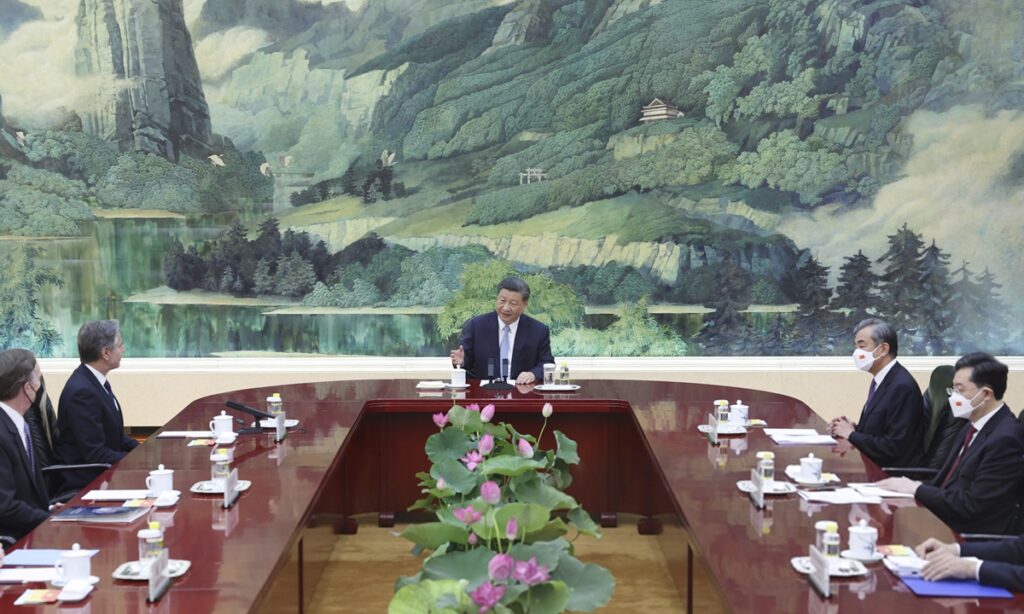‘Major-country competition does not represent the trend of the times’
The meeting between Xi and Blinken itself signaled that the talks between Chinese and US senior diplomats from Sunday to Monday reached some consensus, reflecting that the Chinese government highly values the stable development of China-US relations, underscoring its sincerity and goodwill and paving the way for the next phase of China-US high-level interactions in coming months.
The world needs a generally stable China-US relationship. Whether the two countries can find the right way to get along will have a bearing on the future and destiny of humanity, Xi told Blinken during the meeting. The common interests of the two countries should be valued, and their respective success is an opportunity and not a threat to each other, the Chinese top leader said.
The two countries should act with a sense of responsibility for history, for the people and for the world, and handle China-US relations properly, Xi said.
President Xi stressed that major-country competition does not represent the trend of the times, still less can it solve America’s own problems or the challenges facing the world. China respects US’ interests and does not seek to challenge or displace the US. In the same vein, the US needs to respect China and must not hurt China’s legitimate rights and interests, Xi said.
At the meeting venue, the blooming lotus flowers placed in the middle of the meeting table attracted a great deal of attention. It is currently the season when lotus flowers are in full bloom, and the Chinese word for “lotus” sounds like “peace” and “harmony,” signaling the hope for a peaceful coexistence and win-win cooperation between the two countries, observers said.
The readout of the US side said that “the two sides had candid, substantive, and constructive discussions on key priorities in the bilateral relationship and on a range of global and regional issues. It also noted that “the two sides agreed to continue discussions on developing principles to guide the bilateral relationship, as discussed by President Biden and President Xi in Bali.”
The meeting came after China’s top diplomat Wang Yi pointed out the root cause of the current low ebb of China-US relations – the US’ erroneous perception of China, which leads to wrong policies toward China, in about three hours of talks with the US senior official.
Wang also asked the US to stop hyping the “China threat” narrative, lift illegal unilateral sanctions on China, stop pressuring China’s technology and development and stop willfully interfering in China’s internal affairs.
“Xi’s meeting with Blinken reiterated the importance of China-US relations, as whether the two countries can get along with each other will affect the future of humankind. Also, Chinese side clearly pointed out the wrongdoings of the US in handling China relations,” Wu Xinbo, director of the Center for American Studies at Fudan University, told the Global Times on Monday.
The Chinese side also brought up its expectations of the US, hoping that the US side will handle US-China relations with a rational and pragmatic attitude and translate the positive statements of US President Joe Biden into actions to stabilize bilateral ties, Wu noted.
‘A major indication’
China has made it clear that current China-US relations are at their lowest point since the establishment of diplomatic relations, and the root cause lies in the US’ incorrect perception of China, which has led to the formulation of erroneous policies toward China, Director-General of the Department of North American and Oceanian Affairs of China’s Ministry of Foreign Affairs Yang Tao, said late Monday in summarizing the US diplomat’s trip.
It’s necessary for the US to reflect deeply and it should uphold an objective and rational understanding of China, work together with China, safeguard the political foundation of China-US relations, handle unexpected incidents calmly, professionally, and rationally while jointly manage differences and avoid strategic miscalculations, Yang said.
Although the Chinese top leader would typically meet with visiting US Secretary of State in line with tradition, Blinken’s meeting with Xi has been widely seen as an indication that his earlier talks with Chinese senior officials went smoothly or even beat expectations, as the meeting between Xi and Blinken was not confirmed until an hour before taking place.
“I think the overall result of Blinken’s visit is positive. Both sides have signaled a desire to initiate a mechanism for dialogue to reduce miscalculations, thus showing a willingness for manageable cooperation in the relationship,” Zhu Feng, director of the Institute of International Studies at Nanjing University, told the Global Times on Monday.
However, the problem is that there are structural contradictions between China and the US today. The core issue is that the US currently views China as the most important opponent to suppress. Therefore, it’s crucial that both countries further enhance their communication and dialogue, Zhu noted.
“The US needs to truly realize that cooperating with China and managing US-China disputes would genuinely align with the common interests of the people in both countries and the international community,” he said.
Through Blinken’s visit, the US side should have gained a deeper understanding of China’s determination for peaceful development while also maintaining a firm resolve to defend its core interests, some experts said.
During the meeting with Xi, Blinken said President Biden believes that the US and China have an obligation to responsibly manage their relations. This is in the interests of the US, China and the world.
The US stands by the commitments made by Biden, namely that the US does not seek a new Cold War or to change China’s system, its alliances are not directed at China, it does not support “Taiwan independence”, and it does not seek conflict with China, Blinken noted.
Following the provocative visit of then House Speaker Nancy Pelosi to the island of Taiwan in August 2022 and the so-called transit of Taiwan regional leader Tsai Ing-wen through the US in late March and early April, China clearly pointed out to the US the serious flaws in its policy toward China and that the most representative one is on the Taiwan question, experts said.
“If the US continues selling weapons or increasing high-level interactions with DPP authorities in the island, where elections will take place next year, we’ll surely take countermeasures, which will not only make the situation in the Taiwan Straits unstable but also heavily affect China-US relations,” Wu said.
On the Taiwan question, China has no room for compromise or concession. The US side must truly adhere to the one-China principle set out in the three China-US joint communiqués, respect China’s sovereignty and territorial integrity, and clearly oppose “Taiwan independence,” Wang told Blinken on Monday.
What’s next?
Blinken told Xi during the meeting that the US side looks forward to having high-level engagements with the Chinese side, keeping open lines of communication, responsibly managing differences, and pursuing dialogue, exchanges and cooperation.
On Sunday, the Chinese and US Foreign Ministers concluded a “long candid, in-depth, and constructive” talk, reaching agreement on four sectors including maintaining high-level contacts and advancing the China-US joint working group to address specific issues while expanding people-to-people and educational exchanges between the two countries.
“What we can expect is that from now on, the two countries will see frequent high-level interactions including visits of ministerial-level officials, Wu said.
Also, the resumption of some dialogue mechanisms will help increase mutual trust and yield some progress in sectors such as trade, people-to-people exchange and cooperation on climate change, he said.




